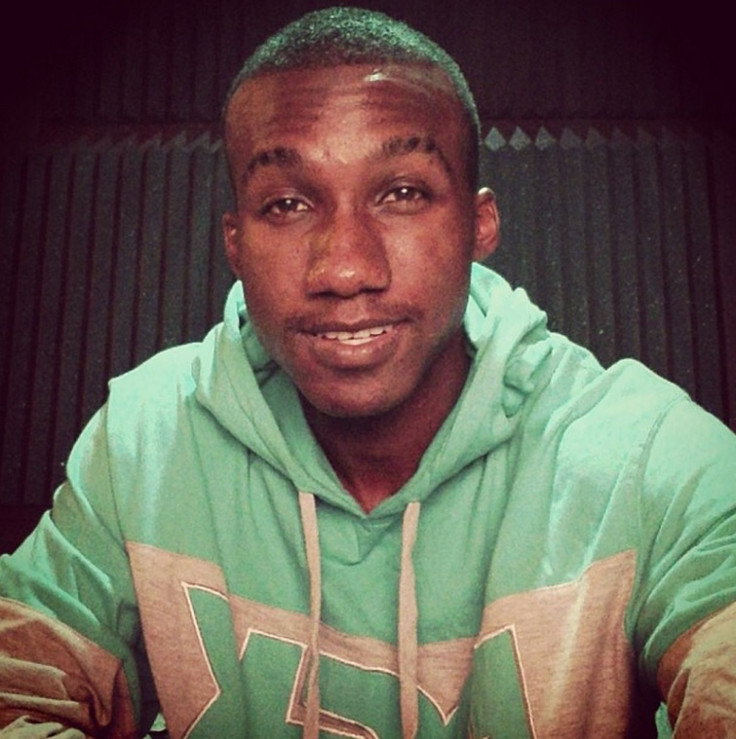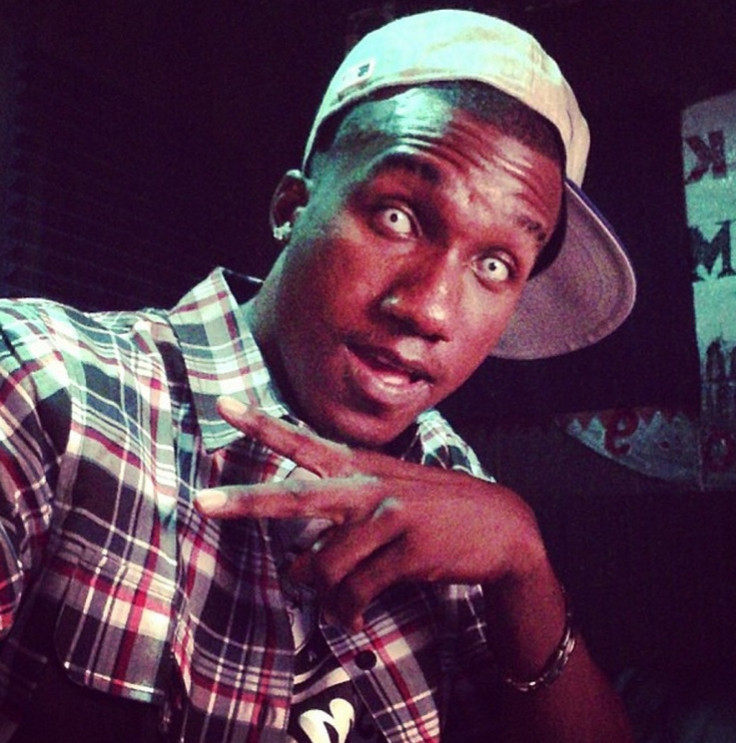Hopsin’s Ill Mind: Rapper Discusses New Album, Haters, Beefs, Life & Death [INTERVIEW]

Los Angeles rapper Hopsin is one of the most outspoken, and unorthodox, members of today’s underground hip-hop scene. His legend has only grown since he burst onto the scene with the July 2012 release of “Ill Mind of Hopsin 5,” a singular moment in the timeline of socially conscious rap that takes direct, piercing aim at the state of American youth and has more than 32 million YouTube views, and he shows no sign of letting up anytime soon.
As a straight-edge satirist with something of an angry streak, the 28-year-old Hopsin, real name Marcus Jamal Hopson, has built a strong following and attained commercial success despite being almost entirely ignored by the mainstream machine that pushes less aware music.
With a new album coming out later this month, and less than two weeks from the start of a tour of the American Southwest with Alabama rapper Yelawolf, Hopsin is back on top of the underground game, but he still has a lot to say to overrated MCs, his fellow Generation Y-ers and haters of all stripes.
On Monday, the International Business Times caught up with Hop in an extended phone interview that touched on topics ranging from his new album to flame wars he’s had with fellow spitters, and from his youth to the way he thinks he will die.
Death seems to be on his mind lately, as “Old Friend,” the emotional first single off his forthcoming third studio album, “Knock Madness,” tells the tragic tale of a childhood pal who died young after becoming addicted to crystal meth. It’s a sad tale of a friendship lost, but it provides Hop with the opportunity to criticize the drug culture that consumes so many young people.
“I’m anti-drugs, 100 percent. I don’t like drugs or alcohol. I never did either of the two, and I don’t plan on it. I’m all about the natural energy people have and having it without enhancement,” Hopsin said Monday. “I want to show people that the decisions they make at such an early age can affect their lives down the road. Life ain’t about drugs. Drugs shouldn’t even be an option for people when they’re feeling down.”
As for his own fate, he believes his loose tongue will eventually get him killed, as he said Monday in a dark moment while discussing the ending of the video for his newest track, “Hop Is Back” -- the second single off his forthcoming album -- in which he is shot dead by two angry kids.
“I just wanted to be funny where it’s like I talk so much s**t in the song thinking I’m all dope, and I end up getting shot," he said. "I always feel that that’s how my death is going to be, that I’m going to be shot in the street somewhere over something I said in a rap song.”
Hopsin, a skateboarding iconoclast who often wears white eye contacts that leave him looking slightly demented, represents a new face of hip-hop, a challenging figure in the mold of Tyler the Creator, but with lyrical content and social intelligence far surpassing those of the Odd Future frontman.

Though Hopsin pushes boundaries and spars with many of his peers both in his rhymes and via Twitter, he embraces a humble transparency that sets him apart from many of his counterparts. He often takes time to Skype and FaceTime with his fans and even skateboards with them before shows, later tagging along to after-parties, where he may be the only one passing on the joint and the bottle untouched.
At the same time, he does seem to harbor delusions of grandeur, saying that “humans are dumb to me,” hiding all the vitriol behind his belief that "I have the freedom to say what I want to say.”
That’s the way he approached “Knock Madness,” which will hit shelves Nov. 26 and features another round of barbs, declarations and sociological criticism, all filtered through the “ill mind” of Hopsin.
“Hop Is Back” generated controversy upon its release Oct. 22, as Hopsin directly called out Kanye West and Kendrick Lamar, two rappers Hop says he respects but believes are not doing enough to elevate the game. It all plays into his critique of modern-day hip-hop, which he says “kind of died down to me,” noting that he “never really liked the rap game the last five or six years.”
Here’s what he had to say about Kanye and his 2013 album “Yeezus,” featuring the controversial song “I Am A God”:
“I was ecstatic to buy Yeezus / But I burned it first / Heard it and snapped in five pieces / Man, Kanye on that bulls**t / That’s why the paparazzi made that n***-a hit his f**king head that’s what that fool get / You think you God now you half-a-- rapper little f****t b***h / Perhaps you suffered brain damage back when you had that accident?”
Strong words coming from a man who has achieved nowhere near the popularity as Yeezy, but the fact that Hopsin would diss Kanye so blatantly comes as little surprise to those who know Hop’s music, and he’s not apologizing:
“Kanye, I just said how I feel about him. I’m a fan of his older stuff, but I don’t like what he’s doing right now. He says some bulls**t sometimes, in my opinion, in what I’ve seen in interviews and whatnot. I’ve had a few thoughts about what he’s been doing lately.”
And Kendrick Lamar, who achieved wild success recently with “Control,” a rollicking diss track of his own, also takes heat from Hopsin on the track:
“But most importantly, hip hop isn’t dead no more you see / Cause Kendrick took the bar and raised it up higher for MCs / Unfortunately the little n***a's like 4-foot-3 / The guys a f****n' midget / His high is still really short to me.”
“I don’t feel he’s raising the bar that high with all the whack rappers in the rap game … It’s definitely not the best song, the hype behind what he did was bigger than the song, in my opinion," Hopsin said. "It’s still dope. Kendrick Lamar is not a whack rapper, not at all. Do I think he's a super-mega-lyricist? Not really. It’s just fun jabs at the end of the day, just because I can.”

Hopsin, currently on the Funk Volume record label he founded in 2009, has taken his fair share of criticism ever since he burst onto the scene with the Oct. 8, 2010, release of “Sag My Pants” a bitingly sarcastic look at the vacant state of rap culture that has generated more than 27 million views on YouTube.
One key criticism that seems to arise in many discussions of Hop is his flow, which is strong but many argue is too monochromatic, which he disputes:
“It’s just the way I prefer to rap. I think every rapper needs a signature style to where you can identify them instantly,” he said. “I’ve seen comments from time to time that ‘he always has the same type of flow,’ but what rapper doesn’t have a similar flow?”
And Hopsin found himself embroiled in yet another controversy after Lord Jamal of Brand Nubian claimed on Twitter that Macklemore doesn’t belong in rap because he is white and therefore a “guest” in a genre run by black artists.
“As far as that dude saying ‘you’re white so you’re overstepping your boundaries,’ that was wrong. We create things on earth and people can run with it,” Hopsin said. “Hip-hop is a universal thing, anyone can talk about anything they want. If you want to rap about apples and plums and start a movement about apples and plums, then you can do that.”
Despite all his talk about free speech in rap and his willingness to engage with his fans, Hopsin does admit that he has a line that fans and haters have been increasingly willing to cross as his star has risen.
“Fans talk to me when I’m out in the world with my girlfriend or whatever and they really say stuff like that,” he says, referencing the beginning of the “Hop Is Back” video, in which he fights back against a group of kids harassing him while he’s watering his lawn. “It doesn’t get that dramatic where I have to fight them, but whether I’m out at Six Flags or a skatepark or something like that, it’ll get to the point where they’re bugging me or annoying me and I’ll have to leave or something.”
It’s just another day in the ill life of Hopsin.
© Copyright IBTimes 2024. All rights reserved.





















